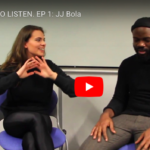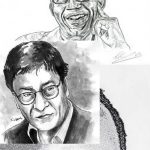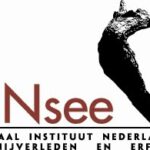by Lene Glinsky
This is a theater play in which Chinua Achebe confronts Joseph Conrad with all the racist contents in Conrad’s novel on the Congo. The research preceding the writing of this play produced 4 main characters; one is the author Joseph Conrad, who will find himself trying to explain his attitude to colonialism which led to the writing of “Heart of Darkness”. He will be supported by the choir of critics, who try to speak in his favour and defend him against the accuse of racism. On the other side we have Chinua Achebe, Nigerian author and as well the person, who started the debate of racism in Heart of Darkness with his 1975 essay “An image of Africa”. He will be supported by the leading figure of the Reader, which is very positively portrayed as a critical and reflected person who leads the discussion, asks questions and contributes impressions of reading as well as academic knowledge. The dialogues are featuring original quotes from literature essays and interviews.
“I SEE NO CHANGES” – Exploring Mass Incarceration in the United States Through Tupac Shakur’s Lyricism
by Aaron Navid Dahm
This paper examines the issue of mass incarceration, especially its most striking feature, the racial dimension. The issue of mass incarceration is, first and foremost, a social issue and, as such, touches upon the lives of individuals, families and communities. By intertwining the music of Tupac, who was a respected voice within the Black community, with contemporary literature, I seek to break with the traditional antagonistic relationship between researcher and research topic and attempt to make the voices heard of those most affected by the here examined issue of mass incarceration. Two major themes are addressed in this paper: mass incarceration as a system of social control and the War on Drugs as the driving force behind this system. Mass incarceration can be understood as the “what” while the War on Drugs answers the question to the “how”, more specifically the question “how did we get here”? Tupac’s lyricism informs the exploration at every step of the way. Many aspects of both the system of mass incarceration as well as the War on Drugs, are addressed in his lyrics and can be explored through them. But Tupac’s voice in this paper transcends the mere function of illustration. His commentary allows the reader to gain insights into the inner life of the Black community and the effects which the system of mass incarceration has had especially on impoverished ghettos. Since the here explored system of mass incarceration has had a paramount effect on a whole population – the Black community – I think of it as my responsibility as a researcher to make these effects visible through an authentic voice from within this community. As we will see Tupac’s lyrics add an invaluable dimension to the effort of understanding this complex issue.
(Deutscher) Kolonialismus in einem Berliner Geschichtsbuch – Eine Rassismuskritische Analyse
by Miriam Bräu und Lea Leutiger (Article in German Language)
Was ist Teil der offiziellen deutschen Geschichte? Und wie wird diese vermittelt? Was wird ausgelassen und welche Perspektiven werden ignoriert? Welche Folgen kann die Geschichtsschreibung auf die Gegenwart haben?
Aus unserer Schulzeit in Deutschland erinneren wir – die zwei Autorinnen – uns daran, dass (deutscher) Kolonialismus kaum thematisiert wurde. Daher wollen wir analysieren, in welchem Umfang und auf welche Art und Weise dieser heutzutage in der Schule behandelt wird. Dafür haben wir uns ein Berliner Geschichtsbuch für die 10. Klasse herausgesucht, das wir auf bildliche Darstellung, Inhalt und Begrifflichkeiten in Bezug auf (deutschen) Kolonialismus untersuchen.
Die Analyse reiht sich in rassismuskritische Analysen europäischer Wissensproduktion ein und zeigt, wie deutsche Kolonialgeschichte im kollektiven Gedächtnis verzerrt wird und koloniale Ideen reproduziert werden.
What do the Belgian Congo and Vietnam have in common? – Tracing Systems of Capitalistic Oppression Through History
by Michael Angulo, Grant Chamness, Sean Gordon and Salome Tash
We will begin by starting with a case study of colonialism in the Belgian Congo. Colonialism is the explicit act of controlling a populace and its resources using colonies with the purpose of economic and political exploitation…These capitalist exploitations will prove to reverberate through time, and will manifest themselves again through neocolonialism and neoliberalism. To demonstrate the timeless and adaptive nature of these motivations, we will present a case study in which colonialism evolves into neocolonialism. Specifically, we will dissect how French colonialism naturally transformed into the neocolonialist, American occupation of Vietnam and ultimately the Vietnam War…In the last portion, we will outline the ways in which the exploitative practices of colonialism are now institutionalized at the international level, and how state actors have given significant power to transnational corporations. This system of corporate control, and the laissez-faire nature of world markets, is what enables powerful neoliberalist countries to continue the legacy of exploitation established by colonialism and neocolonialism. The actions of the International Monetary Fund, and World Bank, are instrumental in the institutionalization of capitalist driven exploitation.
Genocide in the Congo: It’s Time to Listen – A Video Podcast
by Nina Sophie Meyer
Have you ever asked yourself how Congo is the most resourceful country in the world, yet its people are amongst the poorest? “It’s Time To Listen”, sheds some light on the horrors of the continuing exploitation of the African continent, specifically of the DRC and its people. Not only is this topic largely neglected in the mainstream media, the prevailing discourse is having us believe that the struggles of the DRC and its people are neither directly caused by European continent nor actively affect it. This podcast is an attempt to expose some hidden truths, to explain who is concealing them and why.
Sprache und Identität für Chinua Achebe, Amin Maalouf, Ngugi Wa Thiong’O und Mahmoud Darwish
by Iman Kanaan (Article in German Language)
Die geschichtlichen und jetzigen Erfahrungen und Wahrnehmungen des Kolonialismus erfordern die dringende Thematisierung und Problematisierung von Sprachen. Dieses Thema ist zu einem Erkennungsmerkmal vieler postkolonialer Werke des 20. Und 21. Jahrhunderts geworden. Ich werde mich in meiner Referatsausarbeitung auf das Problem, in welcher Sprache Schriftsteller_innen schreiben, sowie auf Sprache als Gesamtheit sozialer und kultureller Identität beziehen. Im ersten Teil meines Beitrages werde ich die Meinungen und Argumente von Chinua Achebe und Amin Maalouf präsentieren, die der Meinung vertreten, dass Autoren_innen aus postkolonialen Staaten in den Sprachen ihrer ehemaligen Kolonialherren schreiben können. Dabei wird sich bereits die Gegenposition von Ngugi wa Thiong’O und Mahmoud Darwish stellen, die ich im zweiten Teil vorstellen werde.
The Lion and the Hunter – The NiNsee Institute and the Dutch Cultural Archive
by S.P. van der Horst
The National Institute of the Dutch History of Slavery and its Legacy Foundation (NiNsee) was one of the main actors working to strengthen the country’s discourse on racism and slavery. The cutting down of funds for this institute in 2012 almost forced this institute to close…Once again, the ‘dark pages’ of Dutch slavery history, of repression, subjugation and domination seemed to become marginalized.
A Cross Analysis: The Effects of the United States’ Intervention in Guatemala – Contrasted with the Autarky of the Cuban Government after 1961
by Michael Angulo and Salome Tash
This paper show how antecedent colonizers found avenues, in the forms of neocolonialism and neoliberalism, by which they could continue the systematic oppression of formerly colonized lands. We will focus on the postcolonial situations Cuba and Guatemala in relation to the role of the USA with these nations. It is our objective to support the notion that while the United States was not a colonizer in the traditional sense of the word, it has become the global hegemon by continuing the systematic exploitation and manipulation of former colonies through neoliberalism and that these manipulations have caused stunted economic growth, political upheaval and violence throughout Latin America.
“We sang our way to victory” – An Un-Intrusive Exploration into the Music and Singing of the oppressed, during the Colonialisation of Africa.
by Asa Towers
This paper aims to explore the significance of music during colonialisation in Africa and the consequential liberation movements. We shall be considering the history of colonialisation and, with the use of three highly influential pieces of literature, we will analyse the story of music in amongst the oppression and struggle. This paper identifies three characteristics of music which it deems integral to its ability to provoke happiness and togetherness. These three characteristics are as follows; its invincible nature, its tendency for collaboration, and its capacity to share messages. These aspects of music are the foundation for its success in terms of encouraging strength and unity in highly oppressed communities.
A Postcolonial Analysis of the 21st Century Migration Discourse
by Wong Yong Li
This essay takes one event that occurred historically in the postcolonial era—the influx of migrants into Europe in the 21st century—and critically reads it in relation to the period of colonization.










